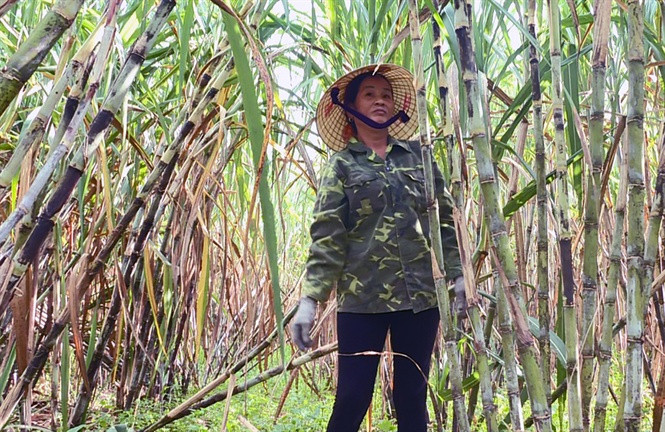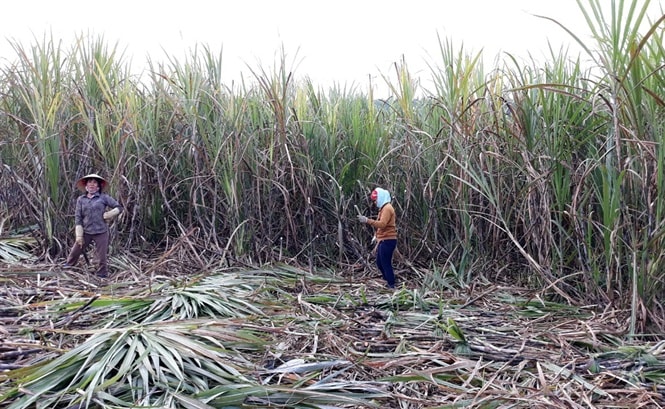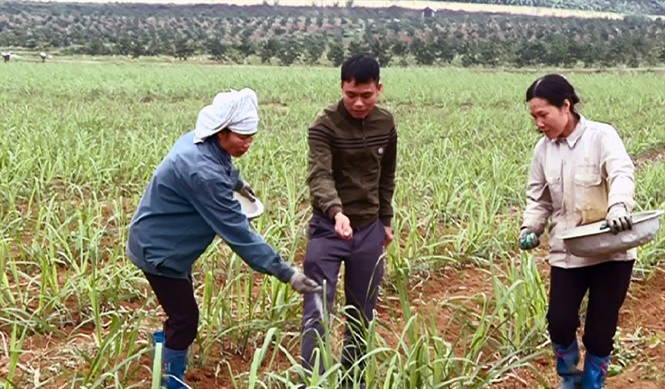Issue an "ultimatum" to keep sugarcane growers
Sugarcane is the main crop of Thanh Hoa, but in recent years, many farmers have turned their backs on this crop. The sugar industry and the government are facing many challenges and need to find ways to increase the economic value of sugarcane if they want to "retain" farmers.
"It's a pity to give up, but a sin to keep"
In the 2018-2019 crushing season, Ms. Vien Thi Son, village 1, Yen Lac commune (Nhu Thanh) has 2 hectares of raw sugarcane, with a yield of about 60 tons/ha/year. According to Ms. Son, with the characteristic of being able to keep the roots for 3 consecutive harvests, her family invested nearly 240 million VND in that area. If the current purchase price of the factories is 750 thousand VND/ton, her family will earn 270 million VND/2 hectares/3 crops.

The sugar industry is facing many challenges.
In 3 years of growing sugarcane, with 2 hectares, her family only earned a net profit of about 30 million VND, which is only about 4-5 million VND/ha/year. Compared to other crops such as cassava, corn, and acacia, sugarcane is not only less profitable but also requires more effort and labor.
“The sugarcane purchase price this year is 250,000 VND/ton lower than last year. If the province and the factory do not have a policy and do not increase the purchase price, we will face many difficulties, many households have switched to growing other crops” – Ms. Son said.
In recent years, Ms. Tran Thi Ly in village 5, Xuan Du commune (Nhu Thanh) has converted 1.8 hectares of sugarcane to grow peaches, red-fleshed dragon fruit and fruit trees. According to Ms. Ly, if this continues, it will only be a matter of time before people abandon sugarcane: "I converted 1.8 hectares of sugarcane land to grow peaches and dragon fruit, and each year I earn a profit of about 100 million VND. Sugarcane is now a big investment but the selling price is low, so many households have switched to growing other crops."
According to the report of Thanh Hoa Provincial People's Committee, sugarcane is still considered a key crop, but in recent years, along with the difficulties of the sugar industry, the sugarcane area in the province has tended to decrease. In the 2017-2018 crushing season, the whole province had 25,667 hectares, the average yield reached 59.48 tons/ha, the average purchase price was 1.046 million VND/ton (10CCS sugar).
In the 2018-2019 crushing season, the area decreased to 24,762 hectares, the average yield is expected to reach 60.4 tons, the average sugarcane purchase price is expected to be only from 718,650 - 838,000 VND/ton.

Many farmers are no longer interested in sugarcane.
If companies do not have a price adjustment policy, in 3 consecutive years of keeping the roots, sugarcane growers will only earn a profit of over 1 million VND to nearly 23 million VND/3 years. That is an unimaginably miserable number for the sugarcane industry in recent years. Farmers turning their backs on sugarcane is something that will happen sooner or later.
"How should the factory purchase so that farmers can still grow sugarcane next year?"That is the "ultimatum" of Mr. Nguyen Dang Quyen, Vice Chairman of Thanh Hoa Provincial People's Committee, given at the conference to summarize sugarcane production in the 2017-2018 pressing season; deploy the production plan for the 2018-2019 pressing season; and orient the development of raw sugarcane for the 2019-2020 pressing season.
According to Mr. Quyen, the locality shares the difficulties of the sugar industry, but does not assign sugarcane acreage targets and plans to localities and then "force" farmers to grow sugarcane at all costs.
“Currently, many other crops that are more effective than sugarcane have been introduced. Factories must announce specific prices and investment policies. It is impossible for each factory to purchase at a different price, leading to competition in buying and selling. If the sugarcane purchase price remains low, I suggest that when factories report their planting plans, districts must recalculate and rebalance, and cannot just assign plans like in the subsidy period...” – Mr. Quyen said frankly. There needs to be many solutions to increase the value of sugarcane to save the sugar industry.

Sugar company representatives said that the world sugar surplus is about 15 million tons. Refined sugar flows into Vietnam through many routes. Our country currently has a surplus of over 2.2 million tons of sugar while the sugar demand in 2019 is only about 1.6 million tons.
The sugar industry in Thanh Hoa also committed to buying all sugarcane output from farmers in the raw material area. The sugar factory only asked for sugar and molasses to use as fertilizer and to reproduce animal feed, while all sugar would be returned to farmers.
In difficult times, Thanh Hoa sugar industry is only trying to maintain the area of nearly 10,000 hectares of raw materials, and for ineffective sugarcane growing areas, people are advised to switch to other crops.
Faced with the difficulties of the sugar industry, Thanh Hoa has many investment policies to support machinery to replace the shortage of human resources in planting, caring for, and harvesting sugarcane; reduce the quantity and improve the quality of sugarcane varieties; increase intensive farming area; change crop structure; create conditions for land accumulation... According to the sugarcane development plan for the 2019-2020 crop year, Thanh Hoa maintains 25,900 hectares of sugarcane, with an average yield of 68 tons/ha. However, in the current reality, the plan to maintain sugarcane acreage is facing many challenges.


